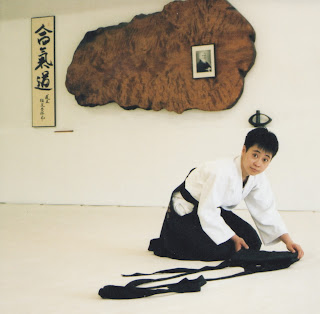The Big Black Skort
"Aikido is a lot like dancing", some say.
I bet those who say so must be pretty good at dancing because, even after over 30 years in Aikido, I find myself really stiff and uncoordinated when trying to dance. Not only do I have two left feet when I dance, my recent attempt to learn to play the ukulele makes me suspect that I might actually have more than ten fingers. Changing chords often results in wild, chaotic misfiring of my many big, fat fingers. Having played the trumpet and violin in high school does not make me good at playing the ukulele at all. Thinking along that line, it makes me wonder why some people who practiced other sports or martial arts, when they come to try Aikido, think that they SHOULD BE good at it right away . . .
I am grateful for these clumsy experiences because, as an instructor -- of Aikido or pretty much anything else, it is easy to forget the struggles of beginners. Years of practice has made many things seem like second nature. Having these awkward moments reminds me that everything is a process and nothing comes easy. We all can use some time, some practice and some encouragement.
The willingness to be a beginner marks the beginning of our journey and it is critical for our success. Ever heard of the story of a Zen master pouring tea for a visitor who asks to become his student? The visitor's cup becomes filled with tea, but the Master continues to pour tea into it. Tea starts to overflow from the cup. Yet, the Master shows no sign of stopping. The visitor finally yelps, "Master, stop! The cup is full. It cannot hold more tea." It is only then when the Master puts down the teapot. "So you realize that one cannot put more tea into a full cup." The Master turns to the visitor with a smile, "With your cup full, there is no way I put anything inside. Go home, empty your cup before you return." People who lack humility will never be good at whatever they are trying to learn.
Similarly, being too thin-skinned, or too eager to defend one's image, or focusing too much on self affirmation are all major obstacles to learning. Learn to embrace and laugh at your imperfections. As Takeguchi Sensei often says in weapons class, "Everybody is allows to drop their stick three times." Every once in a while, he says that after he, himself, drops his stick. So, let yourself stumble. Let yourself make mistakes, but make sure you learn something from it. Otherwise those are just wasted opportunities.
Before Endo Sensei's first seminar in Washington DC, we received an inquiry from a potential participant. He said he was a beginner. In his dojo, everybody wore a hakama on the mat -- including beginners. "Without my hakama, I feel naked." he pleaded. Because hakamas were only worn by black belts in Japan and most Aikido dojos in the US, he wanted to ask Endo Sensei for permission to wear his hakama during the seminar.
We, the organizers of the event, were quite amused by the request. "But you are a beginner! How long could you have been wearing a hakama? You are already so attached to it that you cannot go without?" Was it really the garment he was trying to hold onto, or was it something else? We forwarded the request to Sensei for consideration anyways. We got Sensei's response very promptly: "Only yudanshas can wear a hakama. He does not have a black belt. He should just come in his gi." But then a while later, Sensei sent another message: "I only have to watch him move, I already know his level. It really does not matter to me. If it is so important to him, let him wear his hakama."
A lot of people are like this person who insists on wearing a hakama. He tries so hard to defend something. He tries so hard to put up a front, to maintain an appearance. But what is the point? Everybody can see who he is and what he is. We care way more about how he moves than what he is wearing. I suspect, he, probably, is the only person who looks at himself differently because of the hakama. I sincerely think that he would be much better off skipping the big black skort and focus his energy on practicing.
Mind you: If you are not careful, a hakama can be a real safety hazard. You can trip pretty badly and get yourself very hurt.



Comments
Post a Comment